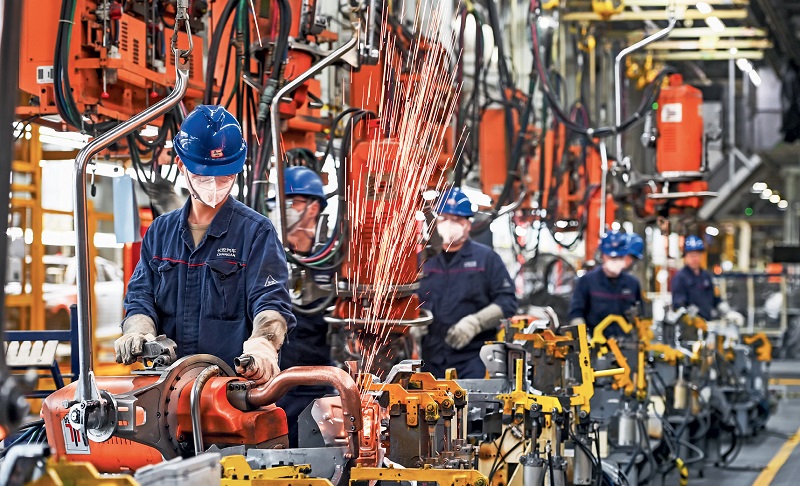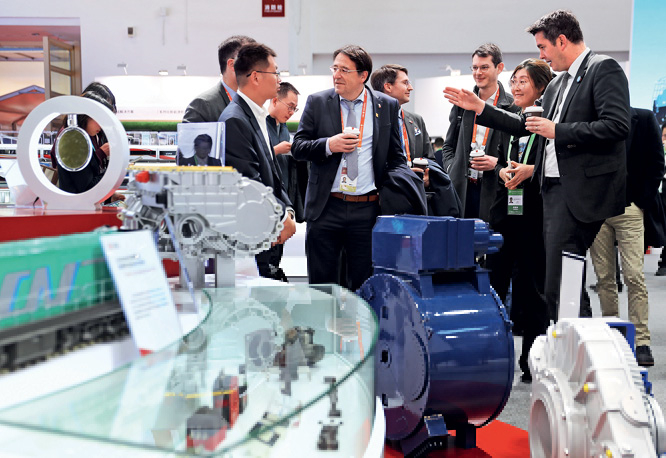
The welding area of a Changan Auto factory in Chongqing Municipality on February 21, 2024.
In October, Japanese electronics giant Panasonic Group opened its co-creation center in Shanghai, the group’s largest and most diverse office in China, integrating finance, logistics, IT, and international procurement.
Tetsuro Homma, executive vice president of Panasonic, told China Economic Weekly, “Facing a grim global economy, Panasonic’s sales in China grew by two percent during the first half of the financial year 2024. We are very proud to be able to achieve growth in China. Our mechanical products, electronic components, and production equipment all have very good performance… China’s robust opening-up policy is a boon for Panasonic’s manufacturing business.”
More changes that have taken place since then make Panasonic’s decision seem wise and prescient. In addition to increasing market access, the Chinese government has been introducing a slew of supportive policies to encourage foreign-funded enterprises to facilitate an intelligent and green transition of the manufacturing industry. Ranging from financial subsidies, tax exemptions, and land concessions to improvement in freight logistics, these policies have boosted foreign investors’ confidence.
China is opening wider to the world to attract global investment. The latest measure to open wider to attract global investment is the 2024 “negative list” of foreign investment access released on November 1. It has reduced the number of restrictions from 31 to 29, with the last two policy restrictions on foreign investment in China’s manufacturing sector being removed.
At a press conference on the updated negative list, an official from the National Development and Reform Commission said China will tap into the advantages of its super-sized market and support cooperation between domestic and foreign enterprises to promote high-end, intelligent, and green development of its manufacturing industry.
China’s manufacturing industry was the first to open up to the outside world and today has the highest level of market competition and the closest cooperative ties with the rest of the world.
According to data of the Ministry of Commerce (MOFCOM), during the first 10 months of 2024, total foreign investment in China amounted to RMB 693.21 billion, of which RMB 192.32 billion went to the manufacturing industry. Investments from Germany, Australia, and Singapore increased by 7.5, 6, and 4.4 percent, respectively, during this period (including investment through free ports). This growth is expected to gain greater traction following the release of the new negative list and other supportive policies.

CRRC, the world's largest supplier of rail transit equipment, receives visitors at its booth in the second China International Supply Chain Expo, held in Beijing from November 26 to 30, 2024.
Building More Resilient Chains
A MOFCOM official said the abolition of the remaining restrictions on foreign investment access to the manufacturing industry is an important measure for building a modernized industrial system. It will help China to become more closely engaged in global division of labor and industrial cooperation, and build more open and resilient industrial and supply chains.
It is also an important step in steering more funding from foreign investors toward advanced manufacturing, high and new technology, and other priority areas, and accelerating the development of new quality productive forces. As domestic and foreign investments are placed under unified management across more sectors, a robust business environment will be created that is market-oriented, law-based, and internationalized, giving impetus to supply-side structural reform and high-quality development.
Hu Jie, a professor of the Shanghai Advanced Institute of Finance at Shanghai Jiao Tong University, said even before the latest change, there were few restrictions for foreign investment in the manufacturing sector. Now the complete abolishment of barriers signals China’s determination to expand opening-up, and sends a positive signal to the international community.
On the heels of the release of the latest negative list, MOFCOM and other three central departments announced a plan to allow wholly foreign-owned hospitals in nine cities, including Beijing, Shanghai, and the two industrial hubs in the south, Guangzhou and Shenzhen, marking another milestone in the opening-up of the medical care sector.
Details about Scrapped Items
The new negative list has scrapped two curbs for foreign investors: “For printing publications, the controlling stake must be held by the Chinese party” and “Investment in the application of steaming, stir-frying, moxibustion, calcination and other processing techniques for Chinese herbal medicines, as well as the production of confidential prescription products of proprietary Chinese medicines shall be prohibited.”
Now that it is fully accessible to foreign capital, what changes can be expected in the traditional Chinese medicine (TCM) industry? Chen Hongyi, CEO of Medical Telescope, a medical science platform, says greater openness will boost the spread of TCM worldwide, make it better recognized, and stimulate its development globally.
“I know some senior specialists whose families have practiced TCM over hundreds of years,” Chen said. “They draw from the experience that has been passed down from generation to generation and customize prescriptions for each patient. However, this highly personalized approach renders the mass production of medicine impossible. As a result, many high-quality Chinese medicines are not available to all patients (who need them), and so their value has not yet been fully realized.”
He thinks allowing more foreign capital into the TCM sector will not only bring advanced production technology and management expertise but also lead to globalized production and sales.
Chen Kaixian, an academician of the Chinese Academy of Sciences, said opening the TCM sector wider to foreign investors will increase the globalization of China's biomedical industry. It means not only the Chinese but people from all over the world will have access to Chinese medicine. “This will also elevate TCM to a key growth driver in China’s biomedical industry,” Chen added.
Biosyngen, an immuno-oncology company from Singapore which has its China headquarters in Guangzhou, is planning to set up its Asia headquarters in Shanghai. Michelle Chen, CEO and co-founder of the company, told China Economic Weekly, “Our novel drugs have been approved in both China and the U.S. The biggest difficulty is the market (access). Because of the cost, no similar drugs have entered China’s medical insurance catalog. However, we have noticed that the Chinese government is gradually relaxing the restrictions on wholly foreign-owned hospitals, many of whose customers are the target customers of our company. This policy will, therefore, help us explore the market and facilitate advances toward commercial production.”

Another exhibitor at the advanced manufacturing chain section of the second China International Supply Chain Expo.
Growing with China
Many international manufacturers in China say investing in China rewards them with returns that are growing at the same pace as China’s economy.
Mezolen is a Spanish company developing ultrasonic flowmeters that measure the flow of water, gas, or fuel. Yang Tingting, director of its Asia-Pacific section, said the measures China has taken to improve its business environment, such as revising the negative list, strengthening protection for intellectual property rights (IPRs), and cracking down on IPR infringement, are generating benefits for foreign companies.
Mezolen plans to expand its China production center in Changzhou, a city in Jiangsu Province, into a global production center. The company is negotiating with a large private enterprise in China for a major project and a large state-owned enterprise for the use of its flowmeters on offshore natural gas platforms. For Mezolen and other companies, the prospects for future cooperation with Chinese partners are growing. 
SONG JIE is a reporter with China Economic Weekly.